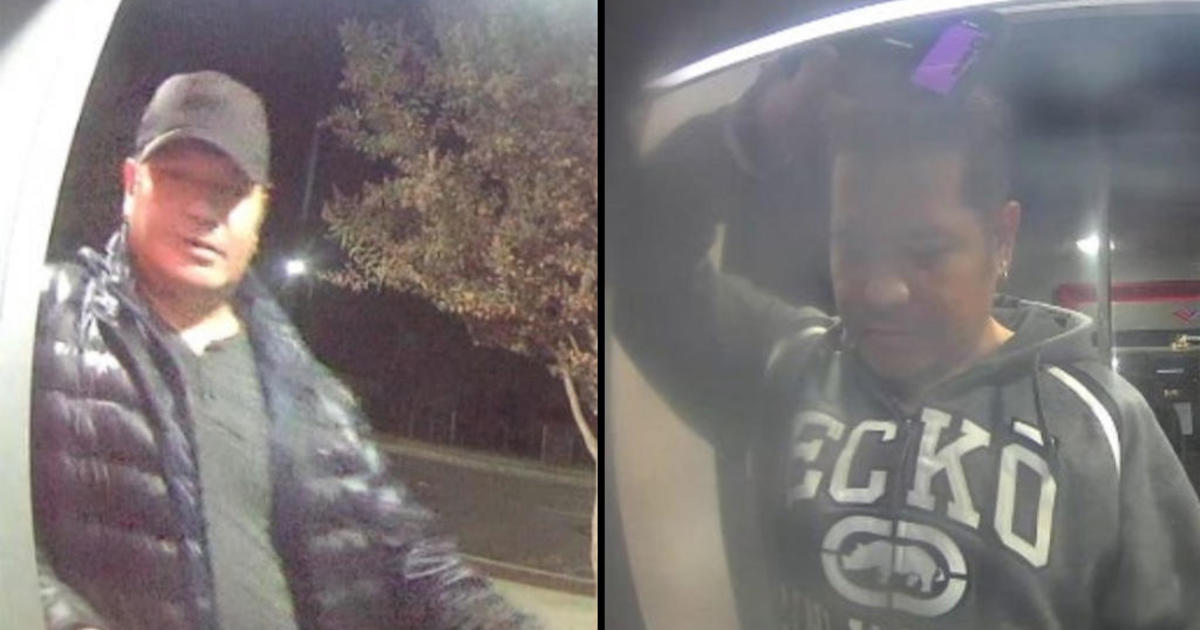Customers Complain BofA Is Drilling Safe Deposit Boxes And Losing Valuables
SAN FRANCISCO (KPIX) -- You might think a safe deposit box is the safest place for your most valued possessions, but according to a growing number of safe deposit box customers, you'd be wrong.
Three different Bank of America customers say they were blindsided when the bank recently drilled and emptied their safe deposit boxes without their permission or the required notice. They say the bank then lost or damaged tens of thousands of dollars worth of property that was removed from those boxes.
However, most shocking for some, the bank drilled the boxes due to missing account information that the customers say the bank had all along.
Michael & Maggie
East Bay residents Michael and Maggie asked us to conceal their real names for security reasons. They say Bank of America lost $17,000 worth of jewelry from their safe deposit box including family heirlooms and the gems she wore on her wedding day.
Maggie discovered her safe deposit box was empty when she attempted to access the box in February. She and her husband Michael say they were shocked to find their valuables were missing and immediately filed a police report.
"I just got robbed from the bank, they just took my stuff," Maggie said, recounting her first reaction.
The bank later told them it had drilled their box due to missing account information. The bank claimed it did not have information like Michel's social security number and birth date on file. He's a co-signer on the box.
"They never notified us," said Michael.
B of A insisted it sent a notification letter in November of 2015, about a year before it drilled the box. However, Michael and Maggie insist they never received that letter and the bank could not provide evidence it was ever sent.
The couple says the first letter they actually received from the bank came two weeks after she discovered her empty box and months after the bank had drilled it.
And, it turns out, the bank may have had the allegedly missing information all along. Michael and Maggie showed us a copy of their original rental agreement, complete with all of Michael's information.
"My name is there, my social security number is there, date of birth is there, everything it there!" Michael said pointing to a photo of the document on his phone.
However, the couple was even more shocked by the way the bank handled their belongings. After drilling the box, the bank shipped their nearly $100,000 worth of jewelry and irreplaceable possessions to a holding center on the east coast. When they got they valuables back, they arrived in a UPS box. The bank's rental agreement says it may ship safe deposit box contents uninsured.
When the couple opened the box, they said they were horrified to discover that bank employees had removed their delicate jewelry from the individual protective boxes and silk bags, and thrown all the jewelry together. "It took over one hour to untangle," Maggie recounted.
They say several pieces were damaged or broken and after untangling the items the couple discovered $17,000 worth of jewelry was still missing.
They spent the next two months struggling to get answers from B of A.
Mrs. Woo
Mrs. Woo's story is strikingly similar. She said her B of A safe deposit box was also drilled without warning and her valuables were shipped back damaged and in disarray.
Like Michael and Maggie, the bank said it drilled Mrs. Woo's box due to missing information. In Woo's case, the bank said it was a missing social security number for her mother, a co-signer on the box, who had recently passed away.
B of A also claimed it sent Woo a letter requesting the information in November of 2015.
"I asked them to produce the letter," said Woo, "they never did." After we contacted the bank, it did send Woo an alleged copy of the letter, however it couldn't provide delivery confirmation or proof of return service.
When Woo discovered her valuables had been sent to the B of A storage facility on the east coast, she specifically asked the bank manager to hold her items at the facially until she could arrange to have them shipped via special courier.
Woo had seen a similar story that we aired back in 2012 about a B of A customer whose box had been drilled. The bank initially refused to pay for shipping insurance on the full value of the property in that case. The woman had to sue to get her items shipped back fully insured. Incidentally that woman's safe deposit box had also been drilled due to an allegedly missing social security number despite the fact that it was clearly written on her original safe deposit rental agreement.
In light of the 2012 story, Mrs. Woo was concerned the bank would ship back her valuables without insurance on the shipment. However, Woo says B of A disregarded her request and shipped her jewelry back to her bank branch via UPS anyway. The bank would not provide evidence of any insurance on the box.
Like Michael and Maggie, when Woo opened that box, she found her delicate jewelry had been removed from individual protective jewelry bags and was tangled together in a single plastic bag. She shared photos of two family heirlooms that had been damaged in the shipment including a ring with a missing stone and a broken necklace.
She spent the next several months trying to convince the bank to pay for repairs to her damaged jewelry.
Chris Land's Clients
San Francisco Attorney Chris Land says his clients, a Sacramento couple, had a very similar story. However in their case, instead of missing or damaged jewelry, the bank lost their original deed to real property in China.
"They need that deed to enforce their ownership of the property," said Land. "Without it, they're going to lose their property in China."
Like the others, the bank said it drilled their safe deposit box due to missing personal information and claimed to have sent a letter notifying the couple in November 2015. Like the others, Land said the couple never received that letter and the bank could not provide evidence that the notification was ever sent.
"There's no evidence of any registered or certified mail and the bank told my clients they no longer have this alleged letter," said Land.
Like Michael and Maggie, he also has a copy of the original safe deposit rental agreement, complete with the alleged missing information.
Seventeen-thousand dollars worth of jewelry and a property in China, gone, due to missing information that the bank had all along.
Why They 'Can' Drill
According to the Office of Comptroller of Currency, which regulates safe deposit boxes, banks may drill a box without permission due to a court order, search warrant, delinquent rental fees, requests from estate administrators or if the bank is closing a branch.
However, those reason don't apply to any of the people we interviewed.
In each case the bank said it was missing information that banks are required to maintain under the Federal Bank Secrecy Act, part of the USA Patriot Act.
While nothing in the federal regulation specifically authorizes a bank to drill a safe deposit box due to missing information, the bank rental agreement does specify that the bank can terminate a rental agreement for "failure of any renter to provide proper identification upon request."
Each of the customers who came to us note that they never received a request for information or notice that their box was at risk of being drilled.
The bank said it sent each a letter requesting missing information in November of 2015 however it could not provide proof of delivery for any of them. We asked the bank how many of those letters were allegedly sent out customers and how many boxes had been drilled for failure to respond to that alleged mailing.
The bank would not comment.
Notification is Required
It is unclear how many people may have been affected by B of A drillings in 2016. Many may not yet realize their boxes have been drilled.
Safe deposit box consultant Dave McGuinn says he's recently been hired as an expert whiteness on 17 different cases involving various big banks, and notes that federal law does require banks to provide customers with adequate notice.
"Notification should be made by registered letter or certified return receipt letter so the bank has proof that notice was sent out," McGuinn explained. He trains bank employees on proper safe deposit procedures and says in these cases, Bank of America also had an obligation to flag the customers' accounts.
Michael and Maggie, Mrs. Woo and Chris Land's clients all had other accounts with Bank of America. The customers say they went into their respective bank branches several times to visit the box, or for other banking needs, yet employees never notified them of missing information or told them their box was at risk of being drilled.
Bank of America told us it does "notify customers by mail in accordance with law well in advance prior to drilling a box..." and said it has "protocols to verbally communicate the matter when the customer comes into the financial center to access their box." However the bank would not comment on why those protocols were not followed in these cases.
Safe Deposit Boxes Are Not Insured
Most people don't realize safe deposit boxes are not insured unless you purchase a separate policy from a third-party insurer or add a rider to your homeowner's policy. Many are also shocked to find out that the banks' liability is limited under the rental agreement.
While the FDIC does insure some federal bank accounts, it does not insure the contents of a safe deposit box.
According to the Safe Deposit Insurance Corporation, over the past three years, approximately 50-thousand boxes and $1.3 billion worth of property has been impacted by things like theft, floods, fires and other natural disasters. Those risks are traditionally covered by third-party insurance policies.
However, insurance policies don't cover items lost when the bank drills your box.
"We have no way to track how many boxes have been drilled and the amount of property that's been taken by banks," explained Jerry Pulard of the Safe Deposit Insurance Corporation.
He says banks are not required to report that information to any federal regulator, however they are required to comply with various state unclaimed property laws when they drill and empty an abandoned box.
Who's Regulating the Banks?
Both Pulard and McGuinn note consumers have little recourse when a bank decides to drill a box and subsequently damages or loses the valuables inside. They say lawyers generally don't take these cases unless the losses exceed tens of thousands of dollars and banks rarely reimburse customers for losses on their own accord.
As for government regulators, the FDIC does not oversee safe deposit boxes and Pulard says the Consumer Financial Protection Bureau does not see this as an issue that is under its purview.
"The Office of Comptroller of Currency (OCC) is the only institution that regulates safe deposit boxes, but it's a legacy service so they don't pay much attention to it," said Pulard.
In a statement, the agency said, "The OCC has broad authority to take supervisory action, including enforcement action against banks that fail to comply with applicable law and regulation or operate in a safe and sound manner."
However, we repeatedly asked if the agency would take enforcement action against a bank for unlawfully or erroneously drilling a customer's safe deposit box and/or losing the contents. The agency declined to comment.
It also wouldn't confirm whether it has ever taken action on behalf of a consumer regarding safe deposit boxes, but in response to a Freedom of Information Act request, it did provided statistics on safe deposit drilling complaints.
Bank of America accounted for 23% of recent safe deposit complaints to the agency, second only to Wells Fargo which accounted for 24% of the complaints.
The remaining 53% of safe deposit complaints to the federal regulator were divided among 60+ other federally regulated banks.
Customers can file safe deposit box complaints on the Comptroller's website.
Response
While Bank of America declined to issue an official response to any of these cases, after we got involved, the bank did agree to reimburse Michael and Maggie for their lost jewelry and the bank agreed to pay to repair Mrs. Woo's jewelry.
Land's case is ongoing.



